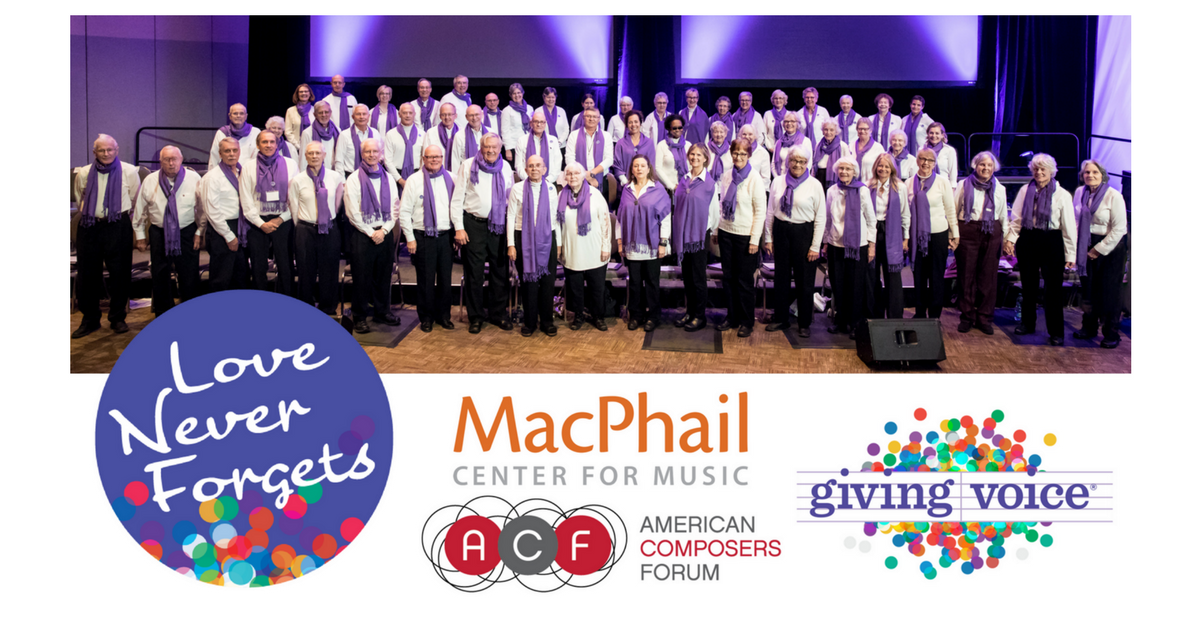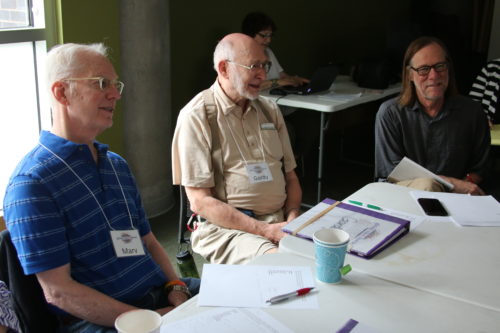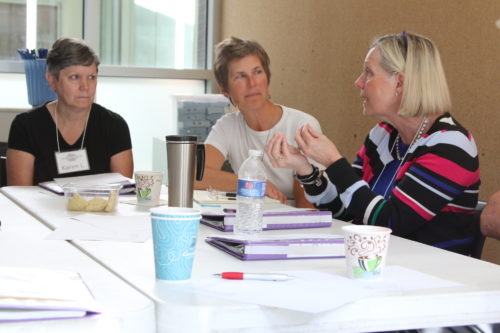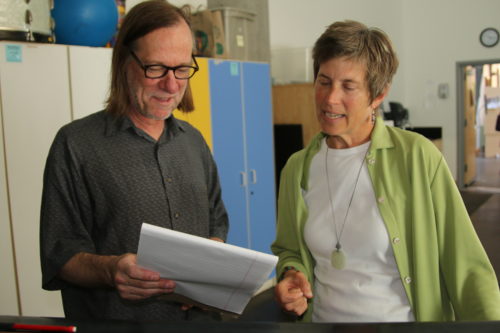Monday, May 7th, 2018

A jubilant celebration of the power of singing together, “Love Never Forgets” illustrates that life with Alzheimer’s can include personal creativity and contribution to community. This inspiring world premiere concert features the first-ever choral work illuminating life with Alzheimer’s – written with and performed by people with the disease and their caregivers. They share their stories, their voices, and their creative passion. “Love Never Forgets,” with music and lyrics by Louisa Castner and Victor Zupanc, was commissioned through Healing & Hope Through Song, an American Composers Forum residency program.
The yearlong collaboration between ACF, Giving Voice, and MacPhail Center for Music will culminate in a performance by 170 singers from across the Twin Cities. On June 16, Giving Voice Chorus members will participate in the world premiere of this joyous and heartfelt music. Tickets to this concert at Ordway Center are sold out, but partnering organizations will be filming the performance, and video will be available online in coming months. Recently, ACF staff sat down with Victor and Louisa to learn more about their work as artists-in-residence these past several months, and to reflect on the experience of becoming a songwriting team for this project. Photos by Linda Brooks.



ACF: What kinds of residency activities did you share with Giving Voice Chorus members, and how did they shape the poetry and music you created?
Louisa Castner: At the beginning, Victor and I set out to invite the singers (those with dementia and their caregivers) to share with us whatever they wanted to say: we hoped to gather reflections and stories from their experiences, in their own words—with the disease, with music and singing, with life. Victor had the great idea to use a list of theme words (e.g., courage, strength, journey, humor, community, friendship) to spark some conversation. We initially thought we might use these themes to shape our musical ideas. What emerged was an amazing collection of images, stories, and phrases that enlivened the heart of our music.
Victor Zupanc: Over a period of 2-3 months we attended rehearsals and performances to get a sense of the choir, and then we met around a table with smaller groups of 6-10 singers. These folks were kind enough to sit and talk about their disease, what it means to them, the struggles and the joys. We recorded these conversations and ended up with a wealth of material from which to extract inspiration for songs. We actually did these meetings with all the local Giving Voice Choir groups: two choirs in Minneapolis at MacPhail Center for Music, and with the Saint Paul choir, at Lyngblomsten Senior Housing.
LC: I think it’s accurate to say that both Victor and I were blown away by how organically we were inspired by this remarkable group of people. We created the music from and for these wonderful individuals.
___________
ACF: The two of you had never met before you were chosen for this project! Was there anything about working as a team that was different from how you imagined it might be? As you were developing and doing these residency activities, can you describe how you collaborated as artists?
LC: Every time Victor and I met with choir members or addressed a choir at rehearsal, we wanted to make sure they understood what we meant by “collaboration.” The Giving Voice members were every bit our fellow collaborators in this project too, and we absolutely wanted them to know that. It became quite clear early on how much they have become invested in this project, for themselves. In nearly every case, the germ of the song came from a story or phrase from a choir member. They gave us the ideas to run with—I’m not sure I had imagined that it could feel so perfectly aligned and inspired.
VZ: Louisa and I clicked from the first time we met. I think we immediately developed a trust in each other’s work, which made the collaboration quite easy. I am the music composer, Louisa is the poet, and that’s how we came into this project. Much of what we have created reflects that distinction. However, we also found that we each had very good ideas that reached into the other’s expertise. Louisa had some thoughts for melodies, and I had ideas for lyrics. We decided, in the end, to credit everything as “music and lyrics by Louisa Castner and Victor Zupanc.” Our collaboration was that well integrated.
LC: I can’t say enough about Victor’s spot-on musical instincts: his respect for my lyrical and musical ideas and his absolute professionalism in producing the scores, demo tapes, etc., throughout the process. But perhaps what I’m most grateful for: Victor and I met each other at the outset of this heart-based project, willing to create honest, gorgeous, poignant, yet joyful music for people touched by a disease we both know too well.
___________
ACF: After the residency ended, how did you approach the writing stage of your collaboration? Or did you write during the residency?
VZ: I don’t think this residency has yet ended. We started writing almost immediately after our first meeting with singers, and we haven’t stopped since. Each time we meet with a new group we find out more; each rehearsal or performance we attend, we learn more. The process has been very rich and rewarding and it continues to create. Our initial plan was to compose three or four songs that would be added to a larger concert program, but now we are featuring almost a dozen new songs that will make up the entire content of the Giving Voice spring concert.
LC: Victor is quite right: we don’t consider ourselves finished with writing songs for these choirs. We both still have ideas we want to pursue. So…stay tuned!
___________
ACF: As the choir now prepares for the premiere, what excites you about the next phase of the project?
VZ: I am very excited to observe the singers as they learn this music. They have been extremely helpful and supportive in our efforts to tell their story, and we have experienced some extremely emotional responses as we shared the music with them. Now they will sing these songs, many of which include their own words. I am hoping that this music can become a vehicle to help them cope with their challenges and celebrate their lives.
LC: Yes, I am also very excited to experience the next stages of this project. Choir director Jeanie [Brindley-Barnett] and her team at MacPhail know that we are eager to support them in coming weeks, as the singers learn the songs and absorb them into their bones. I will be thrilled to see how the choirs take these songs and make them their own.
___________
ACF is grateful to HealthPartners Center for Memory and Aging and Bill & Susan Sands in support of this program. Concert production of “Love Never Forgets” is made possible in part by the John S. and James L. Knight Foundation and Giving Voice donors.
Louisa Castner is a poet, editor, and amateur jazz pianist. She and her 88-year-old father believe they are one of the few, if not only, father-daughter boogie-woogie piano duos in the world. As a poet, her work has appeared in various journals, including Dust & Fire and Calliope. She was managing editor of the erstwhile Evergreen Chronicles, a Minneapolis-based LGBTQ literary journal. Dementia has touched her life deeply: her mother, Katie, lived with Alzheimer’s for twelve years. Surrounded by her musical family, Katie thrived, singing in the church choir and enjoying the liveliness of musical activities. Louisa is delighted by the opportunities inherent in this collaborative venture.
Victor Zupanc has composed music for nearly 300 plays at some of the most prestigious theaters in America including The La Jolla Playhouse, The Guthrie, Playwrights Horizon, SITI Company, The Acting Company, New Victory Theatre, Brooklyn Academy of Music, The Kennedy Center, Missouri Rep, San Diego Rep and The Berkeley Rep. Artists he has worked with include Des McAnuff, Bill Irwin, Anne Bogart, Tony Tacone, Marion McClinton, Robert Woodruff, Stephen Sondheim, Randy Newman and David Byrne. He has composed many concert pieces for various choirs, orchestras and chamber groups and has received numerous major awards and honors around the country for his work. His music has also been heard in China, Japan, Europe, South America, Great Britain, Australia, New Zealand and Canada. In addition, he has scored several feature films and documentaries that have been distributed worldwide including the critically acclaimed motion picture, The Operator by Jon Dichter. Mr. Zupanc’s theme music can also be heard regularly on National Public Radio. Since 1989, Mr. Zupanc has been the resident Music Director/Composer